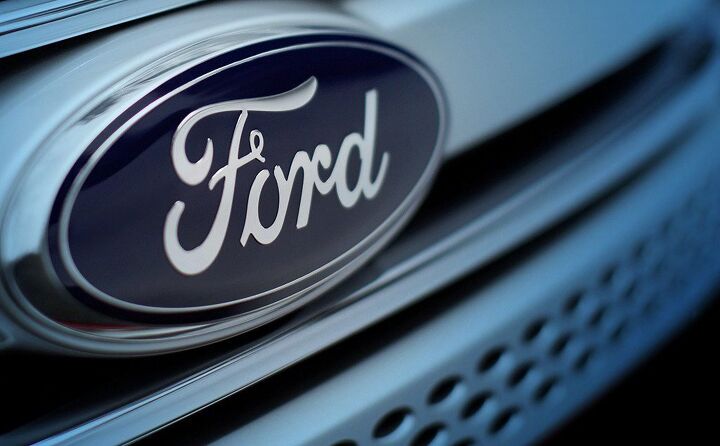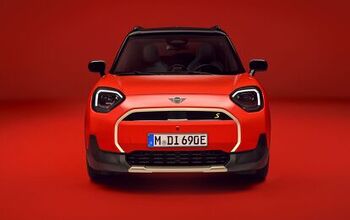Ford's Wristband Solution: Assembly Lines After the Pandemic

Ford is experimenting with social-distancing wristbands as a way to mitigate the spread of the novel coronavirus once factories reopen. In recent weeks, the company has tested various preventative measures at facilities where it swapped from building cars to producing ventilators and respirators to supply hospitals amid the health crisis. While much of that effort revolved around good hygiene practices and the addition of sanitizing stations near assembly areas, Ford also experimented with some outside-the-box ideas.
Workers are now required to complete daily health questionnaires about how they feel and who they’ve been in contact with. But that’s just the start. Most automotive manufacturers are trying to establish a framework allowing employees to return to work without risking secondary outbreaks. For Ford, that means testing dozens of options while factories remain shuttered so the most-useful strategy can be implemented as things return to normal.
What counts as “normal” in this not-distant future sounds like it will be very different than what would have qualified before the pandemic.
Daily checks for fever will probably become the norm for all manufacturers. While some will probably do it the old-fashioned way (not that old fashioned; just a thermometer in the ear) Ford is actually looking at thermal-imaging scanners that would allow for quick sweeps of employees as they move between areas. In addition to requiring less human contact, running an infrared scanner is also believed to be a more efficient way of assessing large groups of people.
But it’s the bracelets that are the most interesting. Phone applications promising an early warning system for those that have come into close proximity with infected have gathered a lot of attention. Google and Apple are even joining forces to establish something similar to what was used to curtail the spread of COVID-19 in South Korea. However, critics have slammed these types of systems as a major violation of our privacy, ready for misuse, and claim they may be ineffective. Most GPS or cell-tower signals aren’t precise enough to work beyond giving your general area, anyway.
One suggested workaround is to use Bluetooth to have phones interface with each other (which is what Google/Apple are doing). But that again has problems. Such a system would only be able to tell you that you were in contact with an infected person after the fact, and both parties’ names would be added to databases (that some say are a bridge too far). Famous NSA whistleblower Edward Snowden famously called all such measures ineffective in an interview with Vice Media co-founder Shane Smith, warning that they may have ugly implications in the long-term — implications that would be nearly impossible to undo.
“Do you truly believe that when the first wave, this second wave, the 16th wave of the coronavirus is a long-forgotten memory, that these capabilities will not be kept? That these datasets will not be kept? Will those capabilities begin to be applied to small-time criminality, for political analysis, for doing things like performing a census, political polling,” he said. “No matter how it is being used, what is being built is the architecture of oppression. And you might trust who is dealing with it today. You might trust who runs it. You don’t care about Mark Zuckerberg.”
“But someone else will have this data eventually, some other country. In your country, a different president will have this data eventually. And someone will abuse it.”
Truth be told, a lot of the preventative measures being floated play into a fool’s paradise to some degree. Still, the world needs solutions and time has been a factor since before COVID-19 started its spread.
Ford’s solution seems to remove some of the potential to create a dystopian society by leaving everything at the factory. Rather than relying on cellphone networks, the wristbands could simply work as on-site proximity sensors. Employees can slip one on and, if they’re calibrated correctly, get a buzz when they get too close to someone else (six feet). Think of it as an invisible-fence dog collar intended for people, but without the accompanying electric shock. Actually, upon re-reading that last line, it does sound slightly dystopian.
The full details on the functions and features of the wristbands have yet to be explained, though Ford is currently running them on a trial basis, Bloomberg reports. While the test only involves a dozen employees right now, it could become standard protocol for all factories once Ford goes back to manufacturing cars (and if it feels it’s effective). It’s clear that, whether or not the wristband idea moves ahead, major changes will take place on factory floors around the world when the industrial sector rallies. Things won’t be going back to normal for some time, assuming they go back at all.
[Image: Ford Motor Co.]

A staunch consumer advocate tracking industry trends and regulation. Before joining TTAC, Matt spent a decade working for marketing and research firms based in NYC. Clients included several of the world’s largest automakers, global tire brands, and aftermarket part suppliers. Dissatisfied with the corporate world and resentful of having to wear suits everyday, he pivoted to writing about cars. Since then, that man has become an ardent supporter of the right-to-repair movement, been interviewed on the auto industry by national radio broadcasts, driven more rental cars than anyone ever should, participated in amateur rallying events, and received the requisite minimum training as sanctioned by the SCCA. Handy with a wrench, Matt grew up surrounded by Detroit auto workers and managed to get a pizza delivery job before he was legally eligible. He later found himself driving box trucks through Manhattan, guaranteeing future sympathy for actual truckers. He continues to conduct research pertaining to the automotive sector as an independent contractor and has since moved back to his native Michigan, closer to where the cars are born. A contrarian, Matt claims to prefer understeer — stating that front and all-wheel drive vehicles cater best to his driving style.
More by Matt Posky
Latest Car Reviews
Read moreLatest Product Reviews
Read moreRecent Comments
- Jeff Maybe one day automatic braking will be better sorted out but as others have stated there are too many false alarms and those false alarms could get one rear ended. I agree about the tire pressure monitoring systems when the batteries go out on the sensors they don't work and they are never meant to last forever. Just buy a good tire gauge and learn how to check the tire pressure and put air in your tires.
- Carson D The funding is so they can travel to China to find manufacturers for their parts.
- Carson D 1996 OBD-II was a good set of regulations. Everything after that has been a net negative.
- ABC-2000 I just got a 2024 Crosstrek, first car for me that require 6000 K or 6 month service, I have been told I better follow that schedule if i actually want to keep it.In the last consumer reports survey, it was the only car that got 99 points for reliability, let's hope they are right (:-)
- Jeff I am going to agree with Tim knobs and buttons but I realize that is low tech but much safer than scrolling thru a screen to reset your interior temperature or to turn off the radio. Also bring back the mechanical parking brake instead of the electronic one.


































Comments
Join the conversation
One problem is that the 6ft. distance may not be enough. The actual distance is about 27 ft. It's been a long time since my auto manufacturing days, but 6 ft on a line seems difficult, but maybe doable. I don't know how you'd do 27 ft. It's been a lot of years, so I could be wrong. https://jamanetwork.com/journals/jama/fullarticle/2763852?resultClick=1
We're going to look back at this era and be embarrassed at what a huge over reaction it was, so much of this is just the C Suite getting to virtue signal. There's been all sorts of credible studies that the social distancing guidelines aren't all that effective, and on something that's being handled, that's how it would be spread. So get a factory to wear some gloves and a surgical mask (and some common sense) for the next few weeks just like grocery workers. Problem solved, we don't need to give MegaCorps the keys to the kingdom.